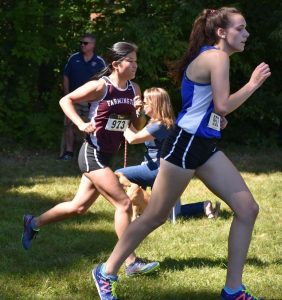By Devin Lachapelle – Contributing Writer
As the fall semester nears its midpoint, student-athletes at UMF say that they’re able to balance demanding coursework with busy sports schedules thanks to hard work, effective time management and the help of friends and coaches.
Gwen Baker, a junior and member of the women’s cross country team, said that strong time management skills are extremely important for student-athletes given their often-crowded schedules.
“I like to joke that I don’t exist on Tuesdays; I’m busy from 5:30 a.m. to 7:00 p.m., with only a small break in the afternoon,” she said with a laugh. Baker then said, “It’s been a process to learn how to be organized as an athlete. I’ve been very organized because I’ve had to be.”
Michael Pingree, also a junior and a goalkeeper for the men’s soccer team, said that student-athletes often have to make difficult decisions in an effort to not get behind on schoolwork.
“You have to make tough choices and say no,” he said, “whether it be going out of town or going out one night, just because you have a game the next morning.”
Pingree stressed the importance of having a supportive group of friends to help stay motivated. “During the season, you have to have a friend group to keep everything balanced,” Pingree said. “You can really burn yourself out. To have a peer group that you can talk to about it or hang out with really helps.”
Junior and field hockey player Chelsea Ballard mentioned that her game schedule occasionally interferes with her classes. “Sometimes if I have a game on a Tuesday or Thursday night I’ll miss my Social Studies Methods class. We often leave early [for games], so I would miss my Public Writing class as well,” she said.
Ballard went on to describe the steps student-athletes have to take before any planned absences can take place. “Our coach has to sign off on a letter that tells the professor why we’re missing,” Ballard said. “Still, some professors don’t like it when we miss class.”
Ballard, like Baker, credits organization as the key to academic success for students with limited free time. “[Field hockey] takes away from my homework time,” she said. “Being both a student and an athlete, I have learned extremely good time management skills. I’m often going from one thing to another so I have to make sure I have everything organized and set up so I can make the smooth transition.”
Baker, whose athletic schedule also conflicts with her school schedule, stated that while her coaches try to maintain consistent practice times that work for most students, the coaches are flexible and do not penalize players when they do have to miss practice because of classes.

Gwen Baker (Left) competes against an opponent from Saint Josephs College (Right) during the UMF Invitational at Mt Blue High School in early September. (Photo Courtesy of C.J. Jenkins)
“Practice is at 3:45, which is usually a happy medium for everyone. I can’t run until after practice because I have Journalism then,” Baker said. “Coach knows I’ll still do the workout on my own.”
Moninda Marube, an assistant cross country coach at UMF since fall of 2016, agreed that coaches try to adapt to the needs of individual students.
“We work with their professors to ensure that classes do not fall on our training schedule or if they do, we always figure out how a student would best get their workout without missing a class.”
Marube emphasized that the key to academic and sports success was having players trust and support one another. “We have not had cases of students burning out yet,” he said. “We have caring team members who always seek to help each other to stand strong in their weak points.” Marube continued, “We have a great team chemistry and we address each member of our team at a personal level.”
Pingree and Baker both cited physical fatigue as a consistent challenge for student-athletes. Pingree said, “The biggest thing is how tired you are every day. You get home from practice, make dinner, shower, and by that time it’s already 7:00. The physical amount of preparation that goes into [sports] is the hardest thing for people to realize.” Baker said, “I’m usually exhausted coming home from weekend meets.”
Chris Strople, an Assistant Professor of Education at UMF, is the academic advisor to several varsity athletes. Professor Strople noted that student-athletes can be at risk of getting overwhelmed.
“Getting burned out by the high workload is certainly a concern,” he said. “I emphasize the importance of maintaining a balance . . . That balance is not universally achieved and so it often will be different depending on the person.”
Professor Strople, a former Division I water polo player at Loyola Marymount University, noted how important it is for student-athletes to have a support system in place. “I do have first-hand experience with the challenge of balancing the responsibilities of both athletics and academics . . . It’s not easy for anyone with the challenge of finding a balance between the two, so I would encourage them to communicate with their teammates, coaches, classmates, and professors for support when needed,” he said.
Baker, Pingree, Ballard, and Professor Strople all agreed that, despite the challenges faced by student-athletes, the connections made are well worth the effort.
“It’s not always about winning or losing,” said Professor Strople, “but often about the friendships built while working toward a collective goal.”
The women’s cross country team heads to Colby College for a meet on Friday, Oct. 6th at 4:00. A day later, the field hockey team will face off against New England College at 2:00 and the men’s soccer team will battle Green Mountain College at 3:30, both at home.
For more detailed information about the fall sports schedules, including schedules of sports not listed here, visit http://athletics.umf.maine.edu/landing/index.